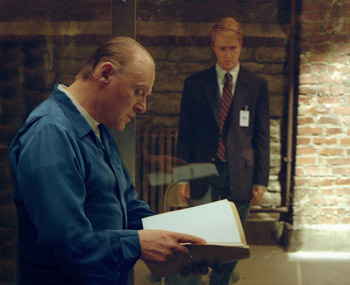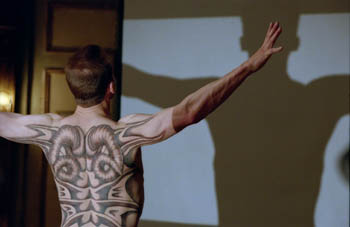![[Metroactive Movies]](/movies/gifs/movies468.gif)
[ Movies Index | Show Times | Santa Cruz Week | SantaCruz Home | Archives ]
Mann Hunter
A comparison to the first film version of 'Red Dragon' illustrates what went wrong with the latest Lector letdown
By Steve Palopoli
HOLLYWOOD JUST LOVES to churn out unnecessary remakes of classic thrillers. And whenever one of the real atrocities comes along--say, Gus Van Sant's Psycho or George Sluizer's American version of The Vanishing--we see a new crop of stories asking, "Do we really need a remake of this masterpiece?" as if we don't already realize the answer is "Fuck no."
But the whole sordid issue of wasting our time with fixes for artistic triumphs that aren't broken is even more irritating with Red Dragon, a movie that desperately wants us to forget that it's a remake of Manhunter, Michael Mann's far superior 1986 adaptation of the same Thomas Harris book. (Manhunter was in fact originally titled Red Dragon, but according to legend was renamed by producer Dino DeLaurentiis to avoid confusion with the 1985 flop Year of the Dragon.)
Under the direction of the completely-in-over-his-head Brett Ratner, whose biggest directorial challenge up until now has been to refrain from strangling Chris Tucker on the set of those goddamned Rush Hour movies, Red Dragon clings for dear life to its supposed rightful place in the Silence of the Lambs cinematic lineage, playing up the Anthony Hopkins three-peat angle and even bringing back a couple of recognizable faces from Jonathan Demme's hit 1991 film--not to mention adding a laughably bad tie-in at the end--as if to trumpet the notion that This Hath Been Ordained Thy Official Version of Red Dragon and Thou Shalt Ask Not About That Other Version Produced Long Ago in the Days of Yore.
Well, OK, you know, it seems fair enough for the filmmakers to want Red Dragon considered on its own terms. But the thing is that this version is at several points simply a bland retread of what has already been done much better in Mann's film--and it can't all be chalked up to the fact that they are both faithful adaptations of the same novel, since even many of the incidental shots are the same. More importantly, a few simple comparisons to its predecessor illustrate perfectly where Red Dragon went so wrong:
1. Casting: Compare William L. Petersen's fierce lead performance as FBI agent Will Graham in Manhunter to Ed Norton's goofy mugging in Red Dragon and you'll understand why Norton is so ungodly boring throughout this movie. Graham is a character who's supposed to be so good at catching serial killers because he's so close to being one of them. In Petersen's hands, Graham was a moody bitch, alternately raging and brooding and always eerily unstable--it's a brilliant and often overlooked performance. Norton, on the other hand, just fronts his way through the whole thing with that insincere smile. Goddamn it, Ed, you're supposed to be able to get into the mind of serial killers, not underpaid barristas!
2. Lector: This is an easy call. The debate over whether Anthony Hopkins' endlessly hyped vision of snooty evil can stack up against Brian Cox as Lector in Manhunter (for some reason in that film it was spelled "Lektor") sprouted up among film cultists after Silence and raged through Ridley Scott's sad-sack follow-up Hannibal. But seeing Hopkins do the same lines as Cox here simply underscores how Sir Anthony has painted himself into an artistic corner with his cheesy cartoon cannibal. Cox played Lector as a real character, a monster so clever he could fool, charm or hypnotize you into believing he wasn't one. But Hopkins is a boogeyman pushed past his prime into parody; he salivates so melodramatically over every line that Lector never seems like anything but comic relief in Red Dragon, which is pretty sad if you consider the way he was able to balance true menace and high camp two films ago.
3. Ambition: Manhunter, despite its occasional dated moments and the fact that Mann was still close enough to his Miami Vice crap to let Petersen wear pink shorts in one scene, remains a fascinating film and one of the few truly unique takes on the modern crime thriller. Its incredible visual flair and epic style seem far more European than Hollywood--in fact, though Mann gets all the credit, it's a matter of record that many of the film's best and most enduring design concepts, such as the flooding blue light in several scenes, came from Italian cinematographer Dante Spinotti. In light of that, it's possible that Manhunter's fascinating transcendence of its genre comes from the way it drops Mann's American detective-film sensibilities into a sprawling, moody European art film. Red Dragon, on the other hand, is an artless, white-bread wonder, outside of a few interesting scenes with Ralph Fiennes' heavily tatooed killer. At times, its cinematic form dips into TV movie territory, with just enough stage dressing to prove they're at a police station or a beach house or whatever and a lack of any kind of visual drive other than to get from point A to point D via points B and C.
The problem, ultimately, is that Red Dragon doesn't give us any reason to want to go. After all, we've been there before, in style.
Copyright © Metro Publishing Inc. Maintained by Boulevards New Media.
![]()

I Took a Screaming What Now and Ran Away From What Now? No, sorry, doctor, all the lambs in my life have been pretty quiet. No screamers. You must have me confused with someone else.

I Am the World's Greatest Shadow Puppet: And look at the cool tattoo I got at Lucky Stars!
From the October 9-16, 2002 issue of Metro Santa Cruz.